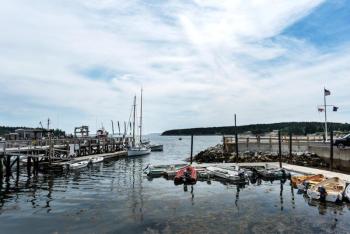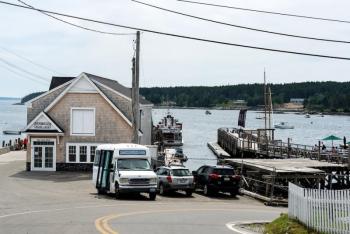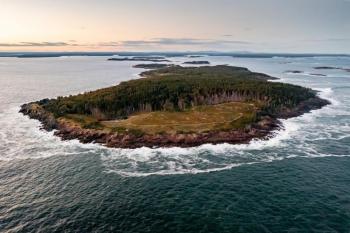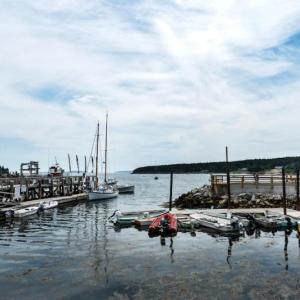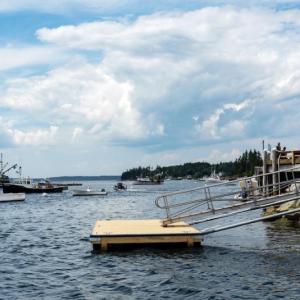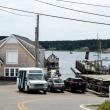Colby College plans to create Center for Resilience and Economic Impact in Port Clyde
With the help of a donation from the Maine-based NorthLight Foundation, Colby College plans to create an interdisciplinary research-and-action center in Port Clyde to help Maine’s cities and towns build and strengthen resilience to adversity and develop plans to foster thriving communities.
The Center for Resilience and Economic Impact is to begin operating in 2026.
NorthLight Foundation is a private foundation established by Dan and Sheryl Tishman, of Port Clyde. The Foundation invests where, "the intersection of human and environmental landscapes and work with organizations to deliver high-impact and systemic change," according to the NorthLight Foundation website.
In an Aug. 21 announcement, Colby College drew parallels with the City of Waterville with its Port Clyde initiative.
"Over the last half-century, Waterville weathered a series of economic and cultural crises with the closure of its textile and manufacturing mills," the news release said. "These catastrophic events led to the loss of thousands of jobs and a steady population decline. The city has proven resilient, and over the past decade has partnered with Colby, federal and state agencies, private investors, and others in a revitalization effort that has led to a growth in population, encouragement of new businesses, and a healthy economic and tax base."
Communities across Maine—and throughout the country—have been tested by similar disruptions, from the loss of major employers to destructive natural disasters and public health crises, the release said.
"Shared challenges underscore the importance of building local capacity and resilience, so towns are not only able to withstand shocks but also to seize opportunities for renewal,"the release said.
“If we examine what is needed to build resilience in different communities across Maine, we can begin to understand patterns and collaborate with communities to develop and scale strategies to adapt,” said Colby President David A. Greene, in the release. “This is truly interdisciplinary work, involving academic, governmental, and local private and public partners.”
As a home for educational opportunities, outreach, and community building, the new center is to work with stakeholders, residents, local officials and municipalities, state and federal governmental entities, and research institutions to make data-informed decisions and evaluate progress in resilience planning through a lens that centers collaboration among community members, organizations and government, social networks, and education.
It is also to help the College expand the reach and influence of its ongoing interdisciplinary scholarship and research conducted on Colby’s Island Campus, which consists of Allen and Benner islands in Muscongus Bay, accessible by boat from Port Clyde.
Colby's Center for Resilience and Economic Impact is the latest entity created as part of Colby’s historic Dare Northward campaign. Dan and Sheryl Tishman formed the NorthLight Foundation to address environmental, land conservation, and related issues in Maine and around the country, the release said.
The effort is to leverage Colby’s strengths and build on key partnerships across Maine with scientists, policymakers, economists, and individuals and organizations directly impacted by environmental, economic, cultural, and public health crises, Greene said.
“Working to build resilience makes economic sense for Maine. Investment in resilience infrastructure, natural shoreline protection, sensible policy implementation, and education yield far better results than expensive repair and damage mitigation,” Greene said. “We are creating an interdisciplinary hub of action that will use data-driven, proactive approaches to build resilience for Maine’s communities, infrastructure, and economy.”
Colby’s decision to establish the center dovetails with an effort by the State of Maine to develop strategies to reduce the risk of natural disasters and related catastrophes and to help communities and private entities recover from them. In 2024 Gov. Janet Mills established the Commission on Infrastructure Rebuilding and Resilience, co-chaired by Dan Tishman, to develop a plan to mitigate risk. The commission issued its final report, A Plan for Infrastructure Resilience, this spring, advocating for a comprehensive approach to integrate resilience principles in decision-making at all levels of government.
Among its findings, the report noted a lack of capacity at the local level to effectively plan for and manage disruptive events, such as severe weather. The same lack of capacity is evident in other crises in Maine and across the country, such as destructive fires, the closing of a mill, or the Covid-19 pandemic, leaving communities more vulnerable and slowing their ability to recover.
“Based on Colby’s experiences in collaboration with the city of Waterville, we recognized that recovering from adversity, whether caused by a disaster or an economic shift, all require a similar focus on a community’s ability to find a path through the challenge toward a sustainable future,” said Provost and Clara C. Piper Professor of Environmental Studies Denise Bruesewitz. “The Center for Resilience and Economic Impact will help fill that gap as a resource for planning, mitigation, and recovery.”
In a statement, the Tishmans emphasized the urgency of investing in community-based resilience, noting that the lessons learned from severe weather can also help Maine confront other pressing challenges of our time.
“We live in Port Clyde—a remarkable part of the Maine coast that, like so many communities, is increasingly vulnerable to disruptive events, including the devastating storms of 2023 and 2024,” they said, in the release. “Thanks to Governor Mills’s leadership, Maine has made meaningful progress, but much more is needed. The lessons we are learning about how to prepare for and respond to severe weather also provide valuable guidance for confronting other pressing challenges of our time—from pandemics to economic disruption. As disruptive events grow more frequent and federal support grows less certain, Maine must chart its own path to resilience. We’re thrilled to partner with Colby College to help do just that.”
The center represents an opportunity to advance Colby’s interdisciplinary work while bringing together science, economics, and policy to drive timely projects that are critical to the welfare of all Mainers.
The Center for Resilience and Economic Impact will benefit from the College’s existing strengths and partnerships and the planned expansion of the science program into engineering and public health, Bruesewitz said. “Colby’s expansion in the sciences will emphasize engineering approaches developed in a liberal arts context that not only solve problems but also enhance community well-being over time, increasing resilience and improving quality of life,” she said.
Coly has a history of fostering partnerships with academic and research institutions across Maine, including the Bigelow Laboratory for Ocean Sciences, Gulf of Maine Research Institute, Island Institute, as well as biomedical partnerships with The Jackson Laboratory, MDI Biological Laboratory, and MaineGeneral Medical Center.





